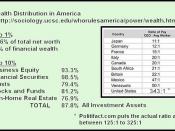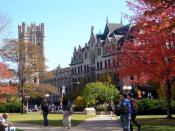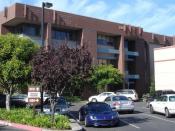Distribution of Wealth If all the wealth in the United States of America were to be distributed amongst all the citizens equally, I believe in time, the money would eventually go back to the way it was distributed originally. I think that it would take longer than five years for this process but within the five years the shift would already be noticeable. The wealthy would slowly be able to regain their wealth from the poor and the poor would eventually become poor again.
The lower class, or those with the least amount of money are people lacking in the essentials of life. These essentials include shelter, food, clothing, and transportation. If the people who are lacking these things suddenly have a lot of money they will use the gain in income to buy better housing, a newer car, and perhaps spend anything extra on luxuries they had not been able to afford in the past.
They might be tempted to buy a bigger house than they can afford, or perhaps a car, which is more expensive. Within the five-year period after the gain in income, they might not be able to maintain this standard of living. People who never have had any money in their lives are not accustomed to saving money, thus leading to the potential loss of home and car over time.
The lower class is in a lower class for a reason. That reason could be that they have not had the opportunities to get the same sort of education as someone who is wealthy. They don?t have the resources to get a better job. If the money was redistributed, the person in a lower class might be tempted to quit their job, thinking they could live on the money for an extended length of time. When the money ran out, they would most likely slip back into poverty because they don?t have the education or same opportunities as those who are wealthy. They won?t be able to maintain a higher standard of living without a good job to continue the positive flow of money. Huge payments on cars and houses would eventually put the lower class back to the lower class.
There is the possibility that the lower class would use their gain in money to try to educate themselves or at least their children. I think this would be one way they could keep the money and actually change status. I don?t think this is likely because people will be too preoccupied with meeting their essential needs.
The gain of extra money would affect the lower class psychologically. When a person has a gain, that person?s motivation to make money does not stay the same. The desire for a job might not be as high as it was when there were bills to pay and children to feed. There is also the notion of prestige to consider. The lower class might not have had the prestige the wealthy generally have. With the gain of a large sum of money, the prestige would shift and the lower class would have a shift in status. That status may or may not last over time. There would be a good feeling about being one of the ?haves? instead of always being numbered in the ?have nots?. This feeling of status might make some of the lower class work harder but in general I think over time, the eventual loss of status might be harder to bear. Unless the lower class invests heavily in education, they will not be able to maintain their new status.
The citizens who would make up the middle class would be, as they always have been, in the middle. They would not gain a great deal of money nor would they lose a lot of money. Their annual income would still be enough to make their existing payments and since they have already met most of their primary needs and purchased essentials, they would not have to spend a great deal of money to change status. For example, one essential need already met by most middle-income people is that of housing. An upgrade would not necessarily be required and some of the middle class might save some money by staying at their present level. There would be those in the middle class, such as those in the upper middle class that might have some of their assets taken away however in the duration of five years, they would be able to recoup their losses. Chances are good that they had good jobs before the wealth was redistributed and that they would still have those jobs afterward. The middle class would go on investing what money they had and this would keep the middle class at a level playing field.
Some of the middle class might have a hard time accepting redistribution of wealth. There is the chance that they would be unhappy that they did not receive as much money as the lower class or perhaps they would be happy they didn?t lose as much as the wealthy class. If it were averaged out, they would be in the middle. That?s why they are in the middle class.
The wealthy people of the United States would not be happy at all with the redistribution of money. They would no longer be able to afford the large payments on their houses and cars. They couldn?t pay for the gas bill or the electric bill on huge houses or factories. They would have to downgrade their automobiles to something that might even get good gas mileage. They would no longer be able to buy anything they wanted, they?d have to be careful about how they spent their money and that would be very boring to them.
The wealthy class owns the majority of the large corporations in the United States. If the wealth were redistributed, that would mean that the owners of these businesses would go bankrupt or worse yet be forced to share their profits with the lower class. Business that we have come to rely on would no longer be able to keep afloat. This would change the entire economy. This change would only be a temporary one. The wealthy class has the education and the skills needed to recoup their losses. They would build on what money they had and eventually end up taking the money from the middle and lower class until they were once again wealthy. More importantly, the wealthy class would have the motivation to overcome the loss and work hard to get their money back. Once you?ve had a great deal of money, it?s nearly impossible to live on very little. This experience of not having the luxuries of the wealthy class would be enough to motivate the wealthy to do whatever was necessary to become rich again.
The quote, ?the rich get richer and the poor get poorer? would best explain the redistribution of wealth after five years. The lower class lacks the education and skills to maintain what wealth they gained. The middle class, for the most part has the education and the skills to maintain their redistributed income. It is the wealthy class, upon losing their wealth, who will be motivated to take back their money. They have all the necessary skills and the education to recoup their money over time. If all the wealth in the United States was redistributed among all classes of people, we would all have a nice party for a few years, all of us except Bill Gates, and then we would go back to reality and Bill would be rich and we would be poor. And that?s exactly what would happen if to the wealth of the U.S. if all the money were to be redistributed.





